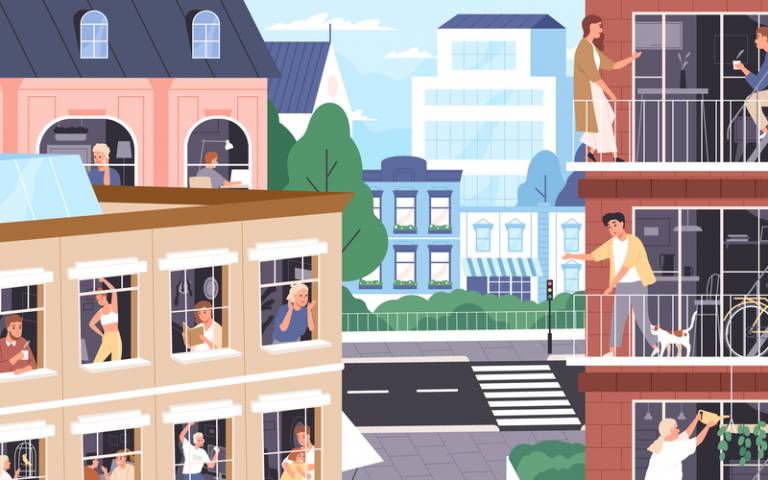
All are invited to the second event in a series on women and urban change. It focuses on what built environments mean for women living, working, socialising and navigating in urban spaces. The online seminar includes presentations on Women in Sao Paolo, the Lebanese Syrian Borderscape, and Ukraine, and a chance for discussion.
Event Information
Open to
- All
Availability
- Yes
Organiser
-
Victoria Howard
Globally, women have been facing increasing pressures in the past three years as a result of accelerated changes and new roles that arose from COVID-19; those have been path-dependent on existing pressures and difficulties they were already facing on a daily basis, including safety, discrimination and exclusion. In recent contexts, women have been at the forefront of intersectional burdens that have been affecting their wellbeing, safety, health, living and working conditions along with their overall resilience and ability to survive.
Organisers: Professor Lauren Andres and Dr Lucy Natarajan
Navigating (gendered) restrictions of the everyday: between the home, the street and the virtual
Dr Susanne Börner, School of Geography, Earth and Environmental Sciences; University of Birmingham
This contribution explores how girls in the urban periphery of Sao Paulo navigate and contest (gendered) restrictions of their everyday lives. Data was collected as part of an ongoing research project on youth everyday agency with girls aged 12 to 16. Using a ‘nexus’ framing, this paper explores how girls experience and challenge entangled restrictions such as gendered security concerns and lack of respect in public spaces, the absence of leisure space for girls outside their homes, limited everyday mobilities, gendered responsibilities in the home, and the challenge of teenage pregnancy. It also explores whether and how spaces outside the home have been further curtailed by covid-19 restrictions. However, rather than depicting girls as ‘placeless’ outside their homes, this contribution shows how young women use their curiosity and imagination as well as humour to challenge gendered roles and as a response to the precarisation of mobility and space. Claiming their homes for sports and exercise such as dance and martial arts, combining everyday chores with music, and escaping into the virtual, as well as using the research project itself to (virtually) explore different everyday realities were only some of the strategies that girls use to navigate and contest everyday restrictions.
Empowerment repercussions and ‘waiting’ modalities through rhythmic activities amongst Syria female refugees living in ITSs along the Lebanese Syrian Borderscape
Dr Paul Moawad, Bartlett School of Planning, UCL
This paper unravels gender role reversal in refugee household responsibilities through rhythmic practices in their protracted ‘waiting’ amongst Syrian female refugees living in informal tented settlements (ITSs). The dominated male traditional role pre-crisis is observed to rescind due to an emerging female economic and status. Results are constructed upon a large-scale ethnographic study which revealed that the common denominator amongst female refugees while waiting, are that they are becoming decision-makers, finding new productive opportunities and turning their passive ‘waiting’ into an active ‘waiting’. This paper decodes how pre-crisis forcefully shrouded skills became unlocked in encampments contexts. Gender empowerment is therefore constantly negotiated and renegotiated due to temporary coping and survival necessities, occupying new tasks within the informal settlements and other than farming within the host-community labour dynamics. The first part of this paper unwraps a bricolage of rhythmic activities that induces empowerment and replaces a passive ‘waiting’ with an active one. The second part examines how the inclusion of the female gender in more commanding societal and economic roles reposition “local community labour dynamics” and “gender roles” Loschmann, Bilgili and Siegel, 2019) enhancing social cohesion and integration in contested territories. The last section investigates the impact of this temporary empowerment on household structure and how the sense of ‘home’, the longing for ‘home’ and the willingness to return ‘home’ amongst Syrian female refugee population is being re-negotiated and re-considered.
Urban housing in wartime: agencies and vulnerabilities of women in Ukraine
Dr Irina Kuznetsova, School of Geography, Earth and Environmental Sciences, University of Birmingham
Prof Oksana Mikheieva, Ukrainian Catholic University and European University Viadrina, Germany
Dr Alona Liasheva, post-doctoral researcher, Center for Eastern European Studies, University of Bremen
As a result of the Russian aggression that started in 2014 in its eastern regions, Ukraine had the highest number of Internally Displaced Persons (IDPs) in Europe, with about 1.4 million people having fled before 2022. The displacement has caused great socio-economic disruption for the vast majority as electoral, property, health and pension rights were challenged. The lack of affordable accommodation was one of the main challenges for IDPs, especially those of pre-retirement age or pensioners. Drawing on the understanding of coping tactics (de Certeau), lived experiences and ‘hybrid’ volunteering practices and upon qualitative research in Ukraine among IDPs, civil society, international organisations and public officials, the paper addresses housing practices of displaced people in urban areas of Ukraine.
See more info about the first event in this series and view videos of each presentation below via the links below:
'Womens' coping strategies in environments of violence and crime by Lirio del Carmen Gutiérrez Rivera, Universidad Nacional de Colombia
Putting our homes at the centre by Rachel Sclicuna, Faculty of the Built Environment, University of Malta
Precarious Infrastructures of Housing, Home, and Care by Brenda Parker, College of Urban Planning and Public Affairs, UIC
Home, shelter, trap by Friederike Fleischer, Universidad de los Andes, Colombia

 Close
Close

